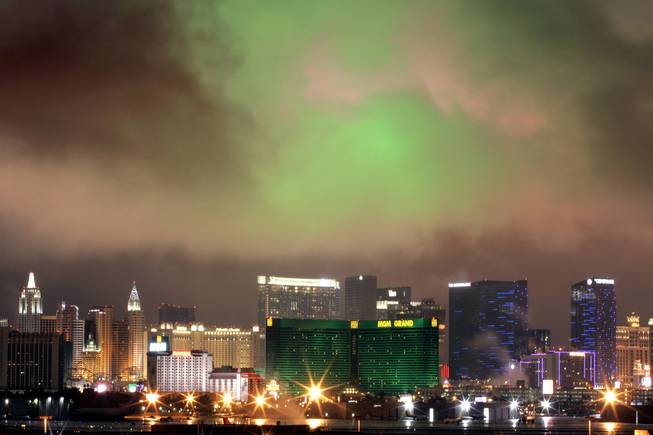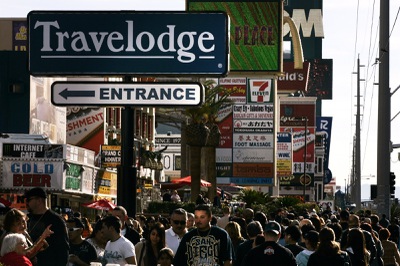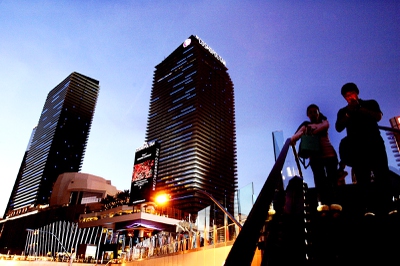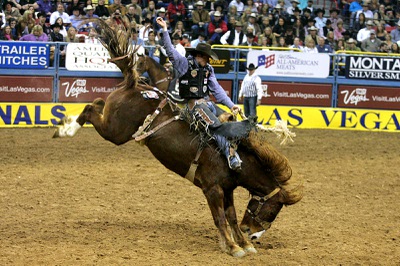
The Strip, with more rooms to fill and recession-weary customers spending less, is finding ways to lure in younger people, who will be casinos’ new customer base as Baby Boomers retire.
Sunday, Jan. 2, 2011 | 2 a.m.
Sun archives
- LVCVA focusing marketing, ad strategy on ‘core’ visitors (12-15-2010)
- Technology, social media changing how tourism leaders market Nevada (12-8-2010)
- Las Vegas economy among worst in the world, report says (12-1-2010)
- Is economic relief in sight for Las Vegas gaming? (11-7-2010)
- LVCVA tailors marketing strategy to post-recession visitors (11-10-2010)
- LVCVA report shows Las Vegas visitors spending less (3-22-2010)
- From MGM to Ruffin: Treasure Island changes hands (3-19-2010)
It’s easy to fret that the glory days are over for the Strip — the wellspring of our economy and icon of our global identity.
After all, so much is going wrong. The slow, semistagnant recovery from the recession. Intense competition in the U.S. and abroad for gambling dollars. Aging Baby Boomers spending less. People seeking gaming venues closer to home. And, if only symbolically, the likelihood no casinos will be built for years.
Still, there are the optimists who believe the Strip’s irrepressible entrepreneurship and ability to dazzle and draw will surmount all obstacles and challenges.
In these dismal days, there is much introspection — backed by the beginnings of action — to guarantee the Strip does far more in the future than merely survive.
“Newness, which has long driven Las Vegas growth, will not be part of the immediate future,” said Bill Eadington, director of UNR’s Institute for the Study of Gambling and Commercial Gaming. “Las Vegas may become yesterday’s news unless it can figure out a new way to reinvent itself.”
Many Strip watchers think it has enough new attractions to lure visitors for years to come. Other experts think casino operators aren’t innovating enough to attract customers.
“There seems to be an attitude in Las Vegas that the business will return once the economy comes back,” said Patrick Bosworth, an industry consultant and former business strategist at Wynn Las Vegas. And yet, the Baby Boomers who have primarily fueled Strip profits for the past 20 years are exiting their peak-spending years and retiring, in many cases, with less money to spend, he said.
“Demographic trends worked in our favor for so long,” Bosworth said. “Now they are working against us. It’s a serious problem ... and a bigger marketing challenge to figure out how to get people with less money to spend it in Las Vegas.”
Although Las Vegas can expect a modest rebound as the economy improves, casino operators will be forced to compete more aggressively for business by fine-tuning marketing campaigns for specific audiences, said Randy Fine, another casino marketer-turned-industry consultant, formerly of Caesars Entertainment.
“This is a capital-addicted industry that has looked to money from Wall Street to solve its problems,” Fine said. “There’s anxiety because there’s no more of that money.”
Although savvy marketing can help, “it’s unclear we’ll ever get back to our best year because that was based on a bubble economy” and before the addition of more than 20,000 luxury hotel rooms to Las Vegas, Fine said. “This is a long-term problem.”
Even the Las Vegas Convention and Visitors Authority — which projects confidence about surviving the recession while area hotels maintain a high occupancy rate — recognizes that the city’s long-running “What happens here, stays here” marketing campaign needs tweaking for a post-recession audience.
Surveying visitors
The authority just wrapped up one of its biggest and most ambitious research projects: Seven months of phone surveys, focus groups and interviews with Las Vegas visitors before, during and after their trips here — even arming some visitors with video cameras to report on their experiences.
The conclusion, said Cathy Tull, senior vice president of marketing: “People want transparency, value and variety.”
Travelers want value packages that allow them to pick and choose what to do and where, Tull said. One example is an all-day restaurant pass that can be used at various resorts owned by the same company. And visitors abhor hidden costs such as resort fees that aren’t fully disclosed upfront.
Research indicated Las Vegas should focus its scarce marketing dollars on people who need an excuse to travel here and those interested in the city who don’t know much about it and need more details to be persuaded, Tull said.
New ads will show specific examples of what visitors can do here, rather than a generic place such as the back of a limo or a hotel room, to evoke a feeling of anticipation, she said.
One recent TV spot follows women in town for a bachelorette party as they eat in a restaurant, take in Matt Goss’ show, descend an escalator at the Forum Shops at Caesars and go to a nightclub, for example.
“There are 41 million people who are not opposed to Vegas and have money to travel, but lack an understanding of what Vegas has to offer,” said Tull, using a figure extrapolated from the authority’s research. “They know we have shows, but couldn’t name them. And they don’t know which chefs are here.”
Still, Tull and other industry executives think the Strip — by changing enough shows and restaurants so that fans return — will be able to rebound from the recession.
Some experts say the Strip might get a bigger boost next year from tourists with a pent-up desire to travel who cut back the past couple of years and companies loosening the purse strings on corporate trips.
“Corporations cut back on travel too much and have realized that to grow business, they have to put people on the road and send them out to shows,” said Jan Freitag, a vice president with Smith Travel Research. Competition is stiff for the nation’s top convention destination, however, as other cities add and upgrade convention facilities, he added.
According to American Express Business Travel, in the third quarter Las Vegas experienced the fourth highest year-over-year increase in hotel rates nationwide after New York, New Orleans and Washington, D.C. Those rates rose 4 percent to an average of $124 per room per night. Overall, businesses increased spending more than consumers in general and across all travel sectors, including hotels, cruises and auto rentals, American Express said.
Betting on Las Vegas
Phil Ruffin, who bought Treasure Island for the discounted price of $750 million in 2009, is among those wagering on a Las Vegas comeback.
That bet is paying off as earnings at his privately owned casino are expected to increase in the first quarter of 2011, he said.
Although casinos are proliferating outside of Las Vegas, the city will attract visitors because of its numerous amenities that can’t be found elsewhere, Ruffin said.
“We have more to offer and at cheaper rates.”
Ruffin seems well situated to weather the next decade: Most of his customers are 40 and younger, have yet to hit their peak spending years and have time to build a retirement nest egg.
Revamping hotel rooms, restaurants and nightclubs may not be enough for Las Vegas — already second to Macau in gambling revenue — to grow as it once did, however.
“In the short term you get more people wanting to come to Las Vegas,” said I. Nelson Rose, a gaming industry consultant and professor of gambling law at Whittier Law School in California. Long term, people will take advantage of more convenient gambling outposts.
Thirty-seven states have some form of casino gambling, and others are pressing for casinos or expanded gambling to grab tax dollars.
Intensifying competition “can only further erode demand for Nevada gaming,” Eadington added.
Slowed growth in the United States has left Nevada’s largest casino companies seeking profits abroad. The stupendous growth of gambling revenue in Macau and Singapore is inspiring other countries, such as Japan, Thailand and India, to consider Las Vegas-style megaresorts. Casino companies are increasingly shuttling customers to Las Vegas from sister casinos in Macau, where taxes are higher and revenue is split with third-party managers. Yet the spread of casinos means more places for Asian high rollers to gamble outside Nevada.
Competing for younger customers
The Strip — and gambling as a whole — face increasing competition from video games and other forms of cheap home entertainment.
A new generation of potential gamblers, now hitting their 40s, grew up with video games and are still playing them for hours on end.
“We haven’t really put them down. Video game developers recognize that and are trying to retain that market with games that appeal more to adults than children,” said Dan Birlew, a Las Vegas resident who has written dozens of strategy books on video games.
Americans spend more on video games, consoles and related equipment than on all casino gambling combined, according to industry sources. And yet, analysts say video games and portable gaming on iPhones and similar devices are capturing time and money that younger generations might otherwise spend at casinos and other entertainment outlets.
“When you play as many video games as I do, it’s nice to get away from a screen and have a real life experience” at a restaurant or show, said Birlew, who gambles infrequently. Still, “if it’s ‘Call of Duty: Black Ops’ versus going to a casino, someone of my generation may have more fun playing a video game all night.”
Casinos have diversified in recent years with elaborate nightclubs and pool parties that attract younger customers who don’t necessarily gamble. They are jumping into social media, with discounts and events promoted via Facebook and Twitter — although marketers say hotels have yet to merge these new media with the rest of their marketing efforts or personalize them enough for individual customers.
Catching up
Because Strip casinos were so profitable for so long, they didn’t have to spend money on technological innovations, Bosworth said. The recession caught casinos off guard and is forcing them to catch up with retailers and other industries that do a better job tracking customer purchases and preferences, he said.
Despite cutbacks elsewhere, MGM Resorts International is investing millions in a customer tracking program to reward visitors for spending money on hotel rooms, meals and other nongambling amenities. Caesars Entertainment has upgraded its system to incorporate nongambling spending and expand beyond its traditional customer base of frequent gamblers, although it rewards more points for gambling, making it difficult for nongamblers to build up points.
The city’s newest resort, Cosmopolitan of Las Vegas, gives nongamblers or occasional gamblers the same access to hosts that gamblers have via a loyalty card that can be swiped at restaurants, shops and the front desk. Customers can also earn other perks such as free hotel stays, much like those offered by nongambling hotels, for staying at the Cosmopolitan.
Some companies are spending money on elaborate hotel pricing systems and gambling technology — all designed to painlessly squeeze more profit out of recession-weary consumers.
Mostly, though, casinos are negotiating lower debt payments, paying off loans and cutting back on frills. Many also are slashing staples, defined as the “maintenance capital” and used for things such as replacing casino carpeting and table felts that quickly wear out.
Even Ruffin, who thinks the Strip has seen the worst of the recession, harbors some concerns about debt-ridden neighbors.
“You have to upgrade your hotel continually. But a lot of these guys are strapped, so some rooms might be getting a little shopworn.”
Catering to the customer
There’s also customer service to consider.
“There’s a natural inclination in many organizations post-downsizing, for employees to duck taking a risk at precisely the time that innovation, creativity and prudent risk-taking are a priority,” said James Berkeley, a London-based consultant who has worked for hotel and gaming companies.
“I question the focus (on customer service) because my recent observations are that outstanding customer experiences, whether it’s an outstanding concierge, croupier, restaurant manager and so on in Las Vegas, has more to do with smart employees doing things through their own volition and personal gratification than identifiable organizational change,” said Berkeley, director of Berkeley Burke International. “I hear more comments that those changes are making life tougher, not easier for those people.”
Although Asia’s world-class hotels benefit from a culture where employees genuinely love what they do regardless of pay, their Las Vegas counterparts can do more with what they have by offering financial incentives to exceptional employees, Berkeley said. Employers should review career goals with underlings and honor workers who not only performed well but “who displayed the right behavior, irrespective of the outcome.”
Fine, the industry consultant, says he has a silver-bullet solution for the Strip’s business woes: “If we could transform the town into a place like Hawaii and Orlando where people go for seven nights, we could fill up all our rooms without adding a single car trip, plane flight or additional customer. Seven-night visits would solve all our problems.”
By marketing Las Vegas as a relaxing retreat rather than a hyperactive party town, the Strip could boost business among visitors who come here in large numbers, he said.
Some experts say that won’t fly and that Las Vegas’ longer-term growth will be hampered by the image that made it a success in good times. Las Vegas is viewed as a fun yet exhausting experience that can’t be sustained for more than a few days, they say.
After flirting with family-friendly attractions in the 1990s, Las Vegas embraced its roots as an adult playground, cementing its image as a brief, whirlwind escape for adults rather than a place to spend a leisurely week with the family.
Despite its many amenities, Las Vegas will have difficulty broadening its appeal much further, said Adam Hanft, an author and marketing expert who has consulted for media giants such as Viacom, AOL and Reuters.
“Perceptually, Las Vegas is one-dimensional. It’s flashy, loud, new and big. If you put people under an MRI, certain segments of their brains would light up when you talk about Las Vegas. You’re never going to expunge that.”
Rather than give Las Vegas a try, Hanft thinks visitors seeking more intimate, personal and less overwhelming environments will likely go elsewhere.
Temptations to spend, crowds and sensory overload make for an exhausting, expensive experience that doesn’t lend itself to a lengthier stay, said David Horne, president of VIP Travel Services, a New York travel agency catering to wealthy clients including celebrities, athletes and Wall Street executives.
“The Vegas experience is being out all night, boozing, gambling and entertainment. I’m 34 and after my third day I’m ready to go home,” Horne said.
Wowing the crowds
Weekends will always be the main draw as they attract a wealthier, more hip crowd “that doesn’t want to be in Vegas on a Tuesday night,” Horne said.
Although the rich seek deals to keep more of their wealth intact, travel experts say the middle class is getting sticker shock as some amenities such as cocktails and night life are “out of whack” relative to the cheap cost of a hotel room.
“Vegas is not a cheap town. If you spend a lot of time on dining and entertainment and night life, tipping this guy and that guy and buying a four-bottle minimum, you’re done after a few days,” Horne said. “And it’s too easy to lose money in the casino.”
Still, Horne doubts that Las Vegas, despite its coming dry spell for new resorts, will lose any of the “wow” factor that attracts both Middle America and the rich and famous.
Some experts think a sports arena could boost tourism by attracting a major league team and other high-profile entertainment acts that could be packaged in a showy way. Critics say it won’t do enough to boost volume. Nor should an arena happen at all if taxpayers are asked to subsidize it given the uncertain payoff of publicly financed stadiums, they say.
When its NFL team isn’t playing there, Dallas’ new Cowboys Stadium has hosted corporate events, religious ceremonies and concerts drawn to its high-tech features and ability to seat 80,000 people. These big events could be held in Las Vegas, with its unique ability to host large overnight groups, Bosworth said.
Competitors opposing Caesars Entertainment’s stadium plans are pursuing “parochial” interests rather than cooperating for the overall benefit of Las Vegas, Horne said.
Having a plan
All is not lost, however. At a time of cutthroat competition, Las Vegas hotel operators are working together on a plan to jump-start business.
One result of the LVCVA’s research has been meetings among the big hotels to discuss the results and develop more citywide events, like the National Finals Rodeo, that end up benefiting hospitality businesses across the valley.
“We’re going to identify three or four events we can embrace as a citywide experience,” said Tull of the LVCVA. “If it’s a Halloween event, we’re going to say, ‘Vegas owns Halloween’ and make sure resorts are offering services and an atmosphere geared toward Halloween.
“And we’re going to talk more about being a destination where we can have major events like NFR, the marathon and NASCAR Champion’s Weekend happening simultaneously.”
It’s all about giving people more reasons to travel in tough times, said Tull, who has overseen frequent changes to the city’s marketing campaign in an attempt to strike the right tone with consumers.
“Before the recession, people spent freely and didn’t need a plan. They were willing to come here and fly by the seat of their pants.”
It’s a new world in Las Vegas, with new rules, Tull said.
“Spending is off and spending will continue to be off. This is a new customer.”





Join the Discussion:
Check this out for a full explanation of our conversion to the LiveFyre commenting system and instructions on how to sign up for an account.
Full comments policy